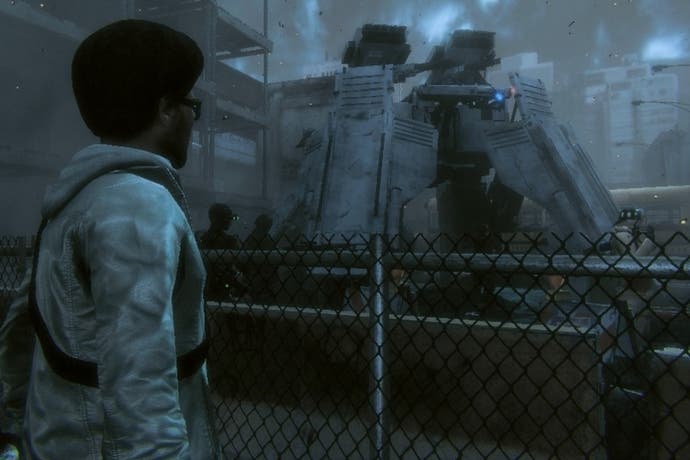Project Awakened: The origin story
After six turbulent years, Phosphor Games' super-powered vision has landed on Kickstarter.
More than fancy boots or crazy powers, the one thing every superhero needs is an origin story: a tale of youthful adversity and the slow, awkward scramble towards triumph. Spider-Man was bullied at school and then bitten by a bug. Batman watched his parents gunned down after leaving Zorro. Captain America... um... let's just say he caught his trousers on a magic nail or something? That sounds about right.
For Project Awakened, the origin story kicks off back in 2007 with a small team at Midway Chicago prototyping a video game. Named Hero, it was inspired by the character creation tools of superhero MMOs, but it would allow you to then take your newly minted cyborg ninja, flying clown, or vengeful aqua-guy and throw them into a full-on action adventure with proper shooting and brawling and plenty of blasting people with funny lightning spikes that burst from your hands.
"Hero started with same basic idea of, 'What if we, the developers, weren't going to tell a player what character they have to play with or how to play through an action game, but they get to decide those things and the game changes and adjusts around their choices?'" says Chip Sineni, director of Phosphor Games, the studio which has recently launched a Kickstarter for Hero's spiritual successor. "This is beyond what some MMOs have done, as those are not true core action gamer experiences. We want a real action game. Hero was approaching a vertical slice, where most of the systems are roughed in and started to hook together, so the rough vision of the game is there."
Enter adversity: in this case, the collapse of Midway in 2009. "We had to leave the code, engine, and assets behind," explains Sineni, "but that vision has carried forward, and grown. Hero was going to be a console game we put in a box and people would have to just enjoy our version of this grand vision. Now, with more powerful engines like UE4, with great PC distribution platforms and communities like Steam and others, and with pioneers like Minecraft showing the world the power and joy of an endless living beta, we can do a much better job of fulfilling that original vision and grow the game in countless ways over time."
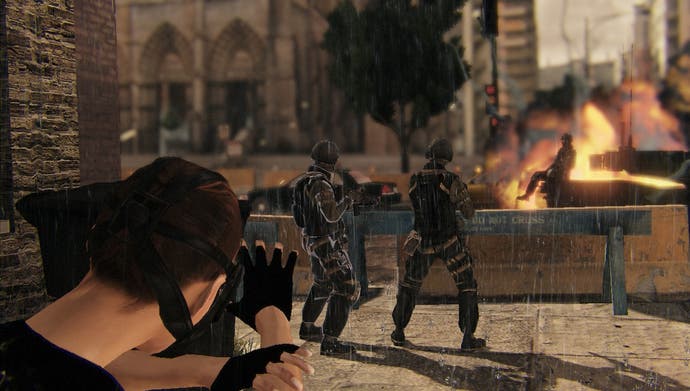
That's the core of Project Awakened, then: a superhero action game with a focus on customisation, funded through Kickstarter and released digitally via a long open beta period. All of which brings us to your origin story.
So, what'll it be?
"You'll start with picking different visual parts for different parts of the character," says Sineni, explaining how Awakened's wonderfully complex create-a-character tools work. "Tops, bottoms, arm and leg accessories, hats, masks, gear, etc. Then you'll get to change the color on those items so you can really feel like you are customising them. We also want you to be able to actually do decals, tattoos, logos, etc. for the ultimate level of customisation. From there you will pick your abilities. And when we say abilities, we mean anything video game characters can do. Magic, mind powers, super powers, melee weapons guns, massive summons, stealth, you name it. If it's been in a video game, we want to eventually support it."
That sounds great - particularly when the team behind the game includes veterans of Psi-Ops and Stranglehold. How will Phosphor ensure the modular character components and skills and powers come together into something that feels coherent and genuinely superheroish, though, and not just like a bunch of atomic spiders got dumped into the sorting room of an old thrift shop? "It's a fair question," Sineni admits. "The first method is that we have been messing with the concept for a number of years, and have developed a sense of how different types of abilities will play off and against each other. We'll keep that up. The second method is that we want to have an honest to goodness closed beta, and then open beta, that really help shapes the game. We need the community to play the game, try stuff out, tell us and each other what works, what is too powerful, what breaks, what is awesome and we need more of. It's a game for the gaming community and we want them to feel a sense of ownership. Like Minecraft, or collectable card games like Magic the Gathering, balance and fun will be heavily crowd-sourced.
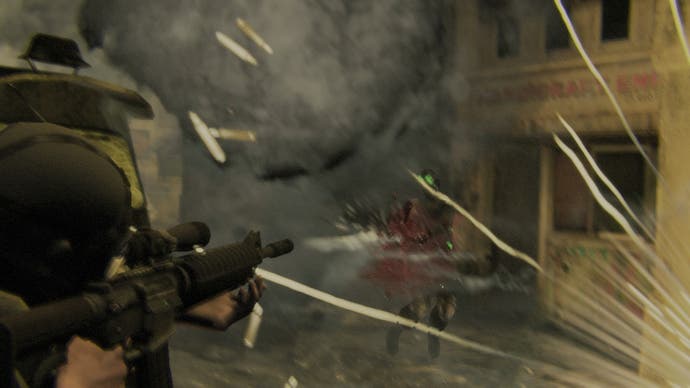
"We will also, by the way, allow people to find ways to break the game for fun in private games and mods if they want," Sineni continues. "If a group of players want to have a 'god' match with crazy overpowered characters, or look for ways to break the physics of the game, or set house rules about only using one summon per match, they can just go and do that."
What about the single-player stuff? How will a game with this much player freedom actually unfold? "The main world of Project Awakened that we are making will be a mature, gritty sort of modern day where technology we now envision as being future sci-fi was all actually invented recently, and people are pretty much going through a new stage of human evolution of power," Sineni explains.
"There's a lot of chaos in such a change that we want to explore along with the player. The single-player story levels themselves will be designed so that how you choose to approach them really changes the experience. Say you want to get through a checkpoint. You can go in guns a-blazing, you can mindjack one guy and have him shoot the others, you can summon a huge tornado or title wave to level it. You can find a roost a ways back, lure the enemies into a trap, or snipe them one by one. You can stealth by without ever being noticed. The single-player game will be hub-and-spoke: there will be a central hub area that is more open world so you can get missions, gear, get a feel for the world, and of course have sandbox fun with your character build and abilities. The spokes will be those more linear story scenarios I mentioned. An hour of play would likely be some time in the hub messing around and gearing up, then taking on a story missions."
It's been a good long time from Hero's inception around 2007 to Project Awakened's Kickstarter, which was unveiled earlier this February. I ask Sineni what it is about the concept that has kept the team energised over the years. "The power and freedom of it," he replies, pretty much instantly. "That's what's kept us going. We're gamers. We want that for ourselves to enjoy, and we want to use our development skills to bring it to others to enjoy. We never envisioned that the PC platform would become such a perfect home for that vision, and as much as we have been dying to get the game made for years, in many ways it's good we waited until all the right pieces were there to support it. That time is now. We've been through numerous generations of game engines, models of play, game designs, dozens and dozens of prototype abilities and combinations, and lots of play testing of all this mixed together. Time and experimentation has only made it better, and allowed us to do more. We get to keep up that process of evolving the game with the player's help."
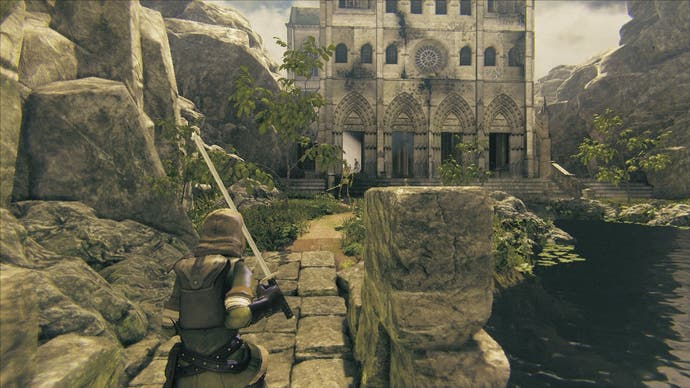
Is it scary to give the player so much freedom in a game? "It used to be scary for all the reasons you might think," laughs Sineni. "What if they don't do what we expect? What if they don't follow our plan? what if they break it? what if they find some overpowered combo or exploit? All the fears you have when you think you know better that the players, or don't want them to see the craft. But we have grown to embrace this and to be really excited about these things. It's a living online game that will grow over time. There are exponentially more people out there who are going to want to get in there and mess with it than we could ever have sitting at desks in our studio, and they are going to find amazing things for us all to enjoy."
And what about the freedom the team's giving the audience in terms of the prolonged beta and the way that feedback will shape the evolution of the game? "This matches with what I was just speaking about. The prolonged beta is where we take our starting point of the vision and bring it to the group that deserves to have a big part of controlling it from there - the players. That is the vision of the game, so it's not threatened by all the hands and minds that will take hold. We have our story idea and world, and feel we are pros at making that, but that will be just one of hopefully countless stories that will grow out of the game."
As of now, Project Awakened exists as a "fairly rough" prototype built in Unreal Engine 3. If the Kickstarter's successful, the team will be able to get the game up and running properly in UE4 for an eventual PC release. The Kickstarter's about to enter its final week, and the team's set a target of $500,000 - which doesn't initially sound like very much for a project this ambitious.
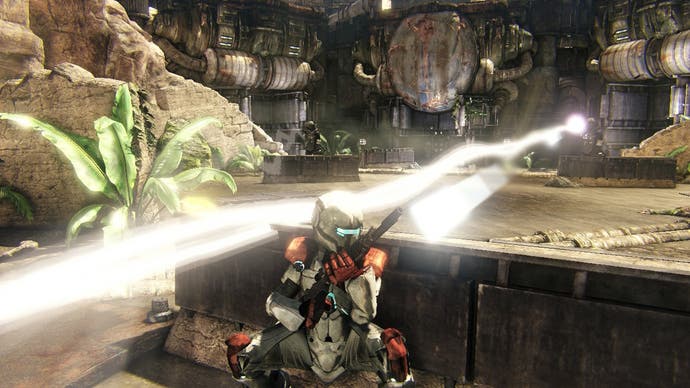
"This may seem really low compared to what you are used to with a huge AAA game on console, but remember - we don't have a lot of those costs," says Sineni. "We don't have cost-of-goods to manufacture, store and ship physical products, or give a cut to retail stores, or - if possible - to other middlemen like publishers. Even marketing gets easier if everyone feels a sense of ownership of the game, and tells other people about it."
In the meantime, Phosphor, which has grown to about 40 people in total, continues to make money from work-for-hire games and co-development titles. Most recently, they created Horn and Dark Meadow for iOS and they have a number of other projects in development. "We wish we had a full time team on Project Awakened," admits Sineni, "but that's the whole point of the Kickstarter - we need a nice chunk of initial funding to get a dedicated team working that won't get pulled off into paying gigs."
That's the other thing about superheroes, though, isn't it? Alongside the origin story, the fancy boots and the crazy powers, you have to have the secret identity: the unassuming newspaper guy, the wealthy philanthropist, the studio-for-hire. For Phosphor, in other words, Kickstarter may hopefully be a bit like that phone booth Clark Kent's always running into to shed his suit and tie before revealing his true nature. There are seven days on the clock and about 60 per cent of the funding still to pull in. Can Project Awakened finally take to the skies?
